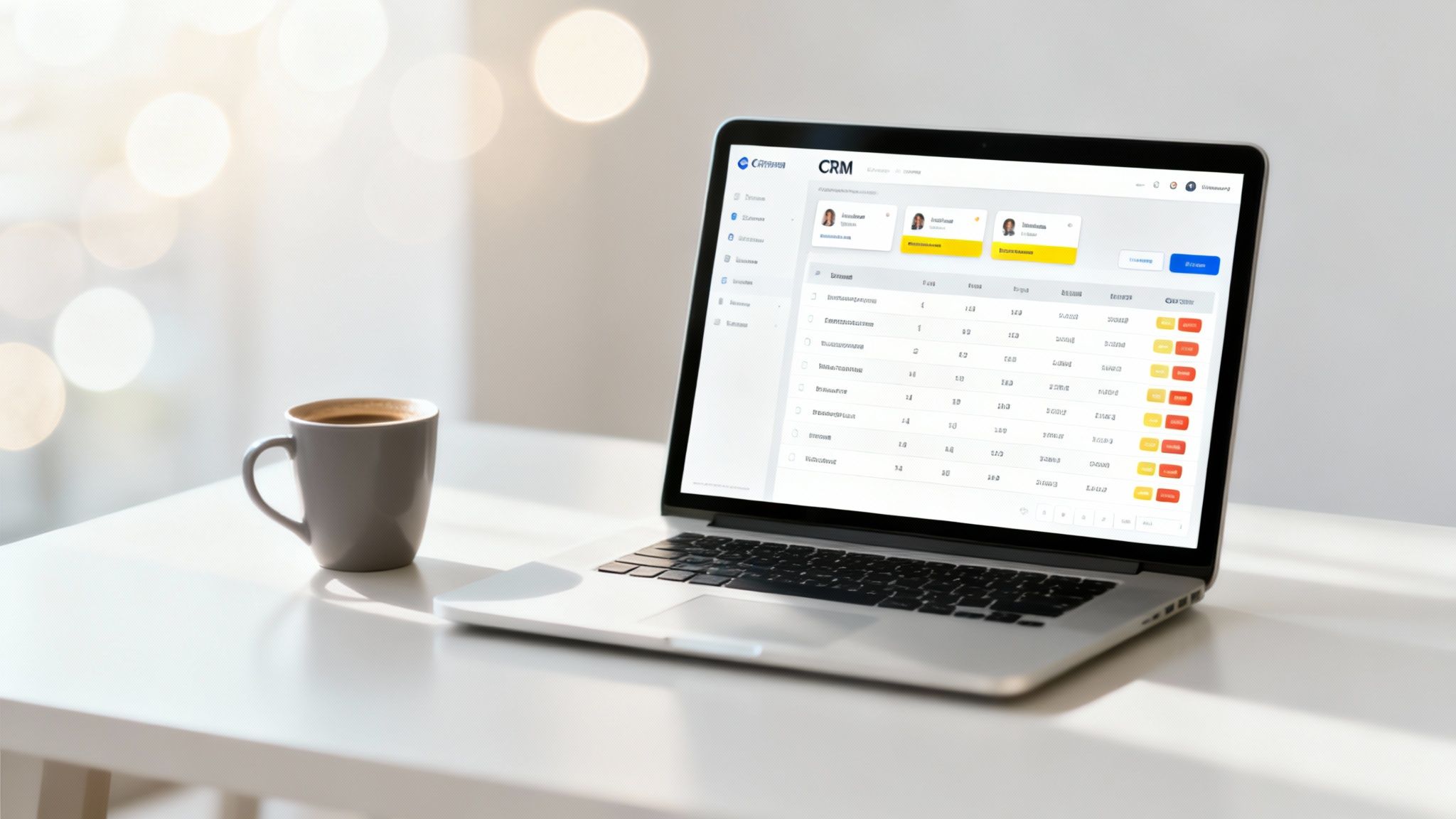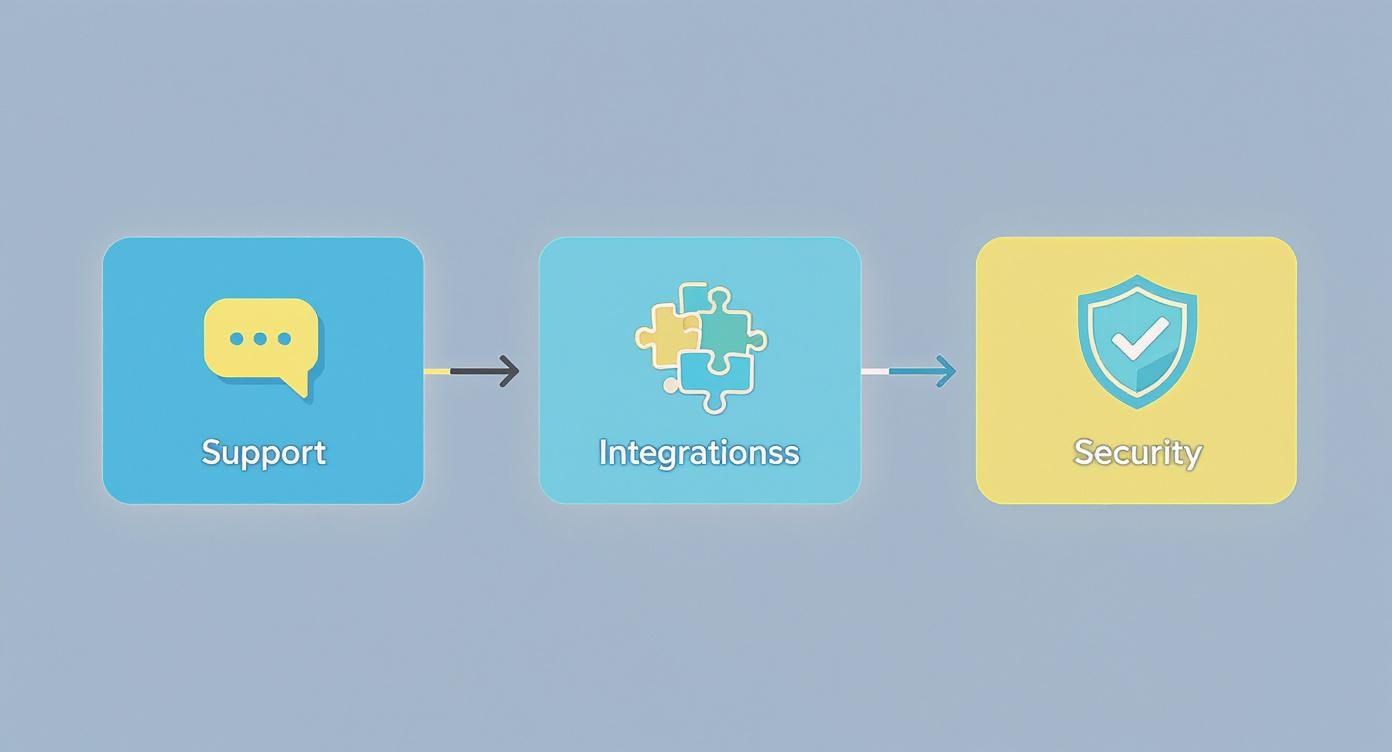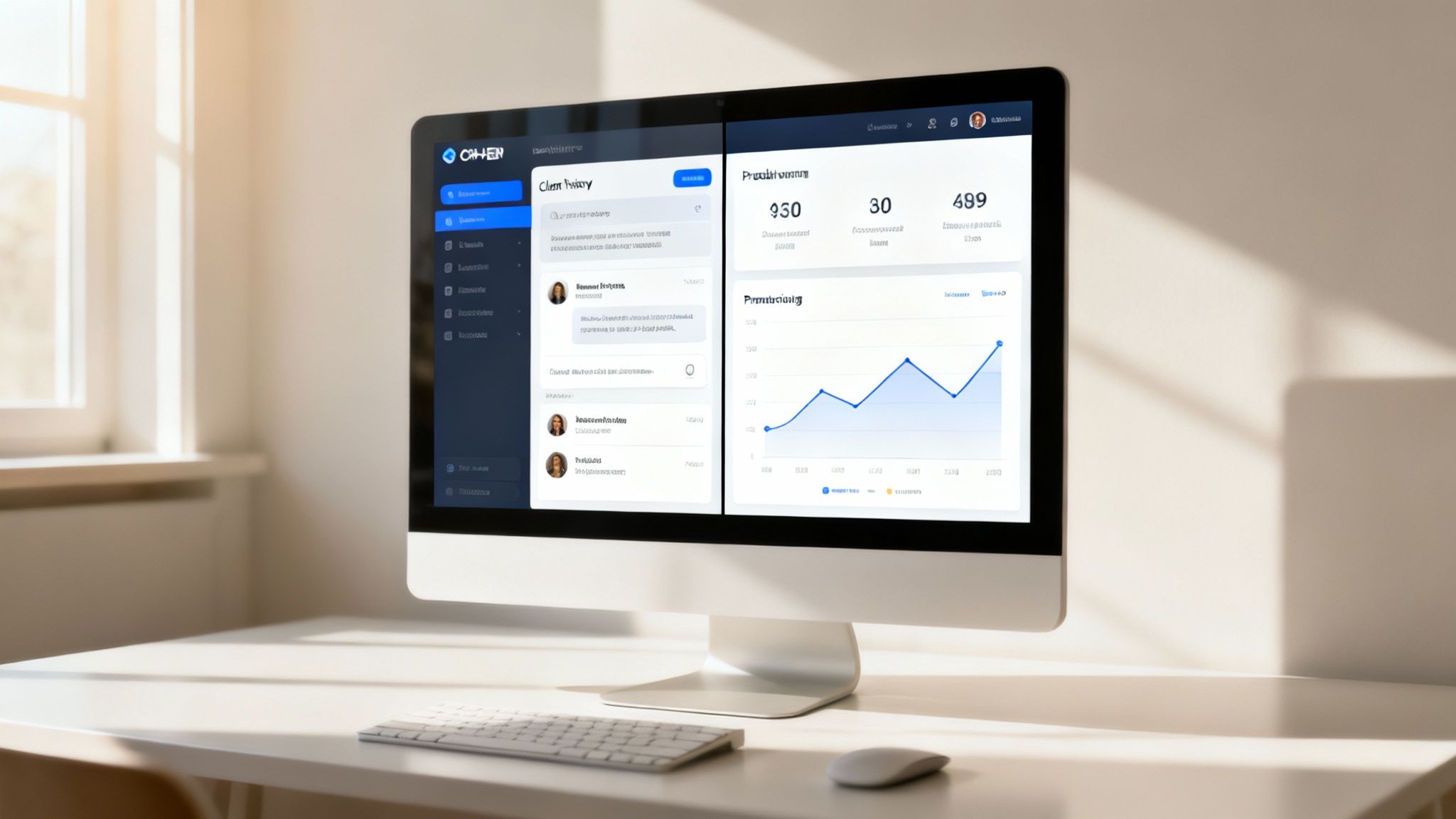Ukrainian crm system: choose effective solutions for growth
Ukrainian CRM system is not just another trendy business tool. It’s specialized software built by our developers for our entrepreneurs. Its main purpose is to bring order to customer relationships, automate sales, and streamline communications—turning the chaos of countless Excel sheets into a single, well‑organized control center.
What a Ukrainian CRM system is and why it matters

Imagine your business as a ship on the open sea. Clients, orders, calls, and messages are the cargo you must deliver. Without proper organization, that cargo is scattered across the deck: some in a notebook, some in dozens of disconnected files, and key details stored only in a manager’s memory. In such disorder it’s easy to lose a lead, forget a callback, or ship too late.
A CRM (Customer Relationship Management) system is your captain’s bridge. It consolidates all key information in one place, helping you see the full picture. Essentially, it’s a digital assistant that meticulously records every customer interaction—from first contact to repeat sales.
But why is a Ukrainian CRM system increasingly relevant? It’s not only about patriotism or a familiar interface language. It’s a strategic choice that brings tangible advantages.
Localization as a key to efficiency
The core difference of Ukrainian solutions is deep adaptation to local realities. They’re built by teams who truly understand the Ukrainian market, legislation, and business culture. That means you get a tool that works almost out of the box.
A Ukrainian CRM isn’t just a translated foreign product. It’s designed around national services, legal frameworks, and the local business mindset—making implementation faster and ultimately cheaper.
Instead of spending weeks and thousands of hryvnias integrating foreign software with local services, you get ready‑made solutions.
Practical advantages for Ukrainian businesses
Choosing a local product directly affects daily operations and security. Key points:
- Built‑in integrations. Ukrainian CRMs usually come with modules for services we use daily: Nova Poshta, Ukrposhta, Rozetka, Prom.ua, local banks and payment systems—dramatically simplifying order processing and automating logistics.
- Legal compliance. Storing personal data is a serious responsibility. Local developers ensure compliance with the Law of Ukraine “On Personal Data Protection.” Servers are often in Ukraine or the EU, providing legal safety.
- Clear support. When things go wrong, you need help quickly and without friction. Ukrainian CRM support teams speak your language, understand your context, and offer solutions that work here.
So, a Ukrainian CRM is much more than a client database. It’s a reliable foundation for stable, transparent processes tailored to your reality. It turns chaos into order and lets you focus on what matters most—growing your business.
Why local CRMs beat foreign alternatives
When choosing a CRM, many look to global giants with big names. It seems the safe route. But in daily use, a local Ukrainian CRM system often works better and more practically. This isn’t about patriotism—it’s about cold calculations and real advantages.
Try explaining to a foreign consultant why you need Nova Poshta integration rather than DHL, or how cash‑on‑delivery works in Ukraine. Local developers live in your world; they grasp your pain points instantly. That directly affects problem‑solving speed and support quality.
This “inside knowledge” is the main trump card of Ukrainian products. They’re built to solve our business problems—not to retrofit global molds to local realities.
Support in your language and context
When something breaks, the last thing you need is a language barrier or explaining market specifics to a script‑bound agent. Ukrainian CRMs offer support that speaks your language—in every sense.
That means you get not a dry technical reply but practical advice based on experience with hundreds of companies like yours. Support becomes partnership, not a formal service.
Ready integrations that save time and money
Perhaps the strongest argument for Ukrainian systems is their ready, “boxed” integrations with key local services. It’s not just convenient—it’s a direct saving of money and developer time.
Most demanded examples:
- Delivery services. Integrations with Nova Poshta or Ukrposhta generate shipping labels (TTNs), track parcels, and change order statuses right from the client card—no tab hopping or manual copy‑paste.
- Marketplaces. Sync with Rozetka, Prom.ua, or Kasta automates product uploads, stock updates, and order processing across platforms in one window.
- Banking. Connections to PrivatBank, monobank, and others automatically reflect incoming payments and link them to specific deals.
Setting up the same integrations in a foreign CRM can easily cost thousands of dollars and weeks of engineering. With a Ukrainian system, you get it almost immediately.
With this depth of integration, a CRM becomes your business command center—not just a contact list.
Data security and legal compliance
Where your data resides is both a security and legal matter. Foreign systems often host in the US or elsewhere—raising risks around cross‑border data transfers.
Ukrainian developers understand local compliance and offer clear terms:
- Server location. Your data is stored in Ukraine or the EU—fully compliant with GDPR and the Ukrainian Law “On Personal Data Protection.”
- Legal accountability. In disputes, you deal with a Ukrainian company—greatly simplifying resolution.
- Financial transparency. Billing in UAH with complete accounting documents—critical for reporting.
Market stats back the localization trend. In recent years, Ukrainian CRMs have seen explosive growth while once‑dominant Russian products collapsed. For example, in 2025 LP‑CRM grew by 309%, and Sitniks CRM by 209%—evidence of trust and real demand. Learn more about these shifts here.
Ultimately, choosing a Ukrainian CRM is an investment in reliability, efficiency, and peace of mind—letting your business run smoothly on tools built precisely for it.
The key question today: choose an off‑the‑shelf CRM like KeyCRM or Perfectum, or a custom CRM built for your business? In reality, few companies offer true product development for your processes rather than integrating an existing one.
Moveiton Web Studio focuses solely on turnkey CRM/ERP development, tailored to each business. We built our own CMF framework, Atom, as a backbone for admin panels and cloud CRM/ERP systems. It’s based on the open‑source CodeIgniter 4 framework, allowing any developer to maintain and enhance it later.
Below is an honest comparison and reasons when and why a bespoke system is worth it.
In short: the main difference
- Off‑the‑shelf CRMs (KeyCRM, Perfectum): fast start, fixed features, monthly fees, vendor‑hosted data, limited flexibility.
- Custom turnkey CRM (on CMF Atom): architecture for your processes, one‑time development payment, hosted on your server, stronger security control, limitless scaling.
Off‑the‑shelf CRM vs Custom CRM
| Attribute | Off‑the‑shelf | Custom turnkey |
|---|---|---|
| Deployment type | SaaS/boxed ✅ | Built for your business ✅ |
| Time to start | 1–3 days ✅ | 3–8 weeks ⏳ |
| Cost of ownership | Monthly subscription; rising costs ❌ | One‑time fee; only needed enhancements later ✅ |
| Process flexibility | Fixed features; customization costly/limited ❌ | Logic, roles, catalogs, funnels—your way ✅ |
| Data hosting | Vendor cloud; bound to SLA/policies ❌ | Your server/on‑prem/UA or EU hosting ✅ |
| Security | Vendor standard ⚠️ | RBAC/ABAC, auditing, encryption, backups per your policy ✅ |
| Compliance | Depends on vendor ⚠️ | GDPR, Law of Ukraine on Personal Data Protection ✅ |
| Integrations | Out‑of‑the‑box: NP, Ukrposhta, Rozetka, Prom, banks, messengers ✅/limited | Any via API/webhooks/queues/ESB; deep two‑way sync ✅ |
| Scale & performance | Within plan limits and platform caps ❌ | Caches, queues, DB sharding, microservices for your load ✅ |
| Cost transparency | Recurring bills, plan limits ❌ | Contract/acts, UAH billing, tracked enhancements ✅ |
| Code ownership | No access; vendor lock‑in ❌ | You own code and architecture; independence ✅ |
| BI/analytics | Default dashboards; limited customization ⚠️ | Custom metrics, LTV/ROI panels, event store ✅ |
| Typical scenarios | Funnel, tasks, TTN, basic inventory & finance ✅ | Unique docs, approvals, complex roles, production cycles ✅ |
| Best fit | Small e‑commerce, quick start, standard processes ✅ | Unique processes, high security demands ✅ |
| Limits/risks | Non‑standard roles/docs/formulas — costly or impossible ❌ | No limits in logic/scale; tailored to process ✅ |
Where off‑the‑shelf CRMs win
- Fast start for small e‑commerce ✅
- Immediate launch with basic features ✅
- Processes still forming ✅
Useful out‑of‑the‑box: sales funnels, manager tasks, integrations (Nova Poshta, marketplaces, telephony/messengers), basic inventory/finance, default dashboards ✅
Limits: non‑standard documents, roles, complex approvals, multi‑warehouse models, specific finance formulas ❌
Where custom CRM clearly wins
- Process as a competitive edge (logistics, SLAs, production, service contracts) ✅
- Strict local storage/security (healthcare, education, B2G, financial compliance) ✅
- Deep integrations with ERP/1C/BAS, WMS, accounting, mobile apps, BI ✅
- High loads, bespoke analytics, predictive models ✅
Advantages: one‑time fee, your own server, code ownership, transparent security (middleware, ACL, auditing) ✅
Security—key points
- Hosting: on‑prem or your DC/hosting in Ukraine/EU ✅
- Access: roles, RBAC/ABAC, activity audit ✅
- Encryption: TLS, sensitive‑field encryption ✅
- Backup/restore: policies aligned to your RPO/RTO ✅
- Compliance: GDPR, Ukrainian personal data law ✅
- Integration security: service accounts, key rotation, network segmentation ✅
Practical scenarios
- Online store + marketplaces: off‑the‑shelf—fast start with Rozetka/Prom, Nova Poshta; custom—complex pricing/promos, multi‑warehouse, SLA delivery, demand forecasting, custom reports ✅
- B2B services/project work: off‑the‑shelf—funnel/tasks/invoices; custom—contract approvals, document flow, time tracking, project margin ✅
- Manufacturing/distribution: off‑the‑shelf—limited; custom—CRM+ERP contour, planning, purchasing, lots/serials, quality, routing, bottlenecks ✅
Conclusion
- Need a quick start and standard processes—choose off‑the‑shelf (KeyCRM/Perfectum) ✅
- Process is your edge, security is critical, need scaling beyond plan limits—custom CRM on CMF Atom ✅
Why Moveiton
- We build on CMF Atom (CodeIgniter 4) “for your business,” not fit your business into a box ✅
- Architectural audit before development ✅
- Security first: hosted on your server, access audit, backups, legal compliance ✅
- Transparent pricing: one‑time build + enhancements as needed ✅
- Support and evolution: from small tweaks to major releases ✅
Want to know what’s best for you? Send 3–5 key processes and security needs—we’ll prepare a comparative plan “off‑the‑shelf vs custom” with budget and timelines.
Key features for effective operations
When choosing a CRM, businesses want real tools for daily tasks—not just menus and buttons. A good Ukrainian CRM system is a practical assistant that turns routine into a well‑tuned, automated process.
Let’s view the key features through real needs of Ukrainian e‑commerce and B2B services. Think of the CRM as your business control panel. Each feature is a lever that helps you move faster, avoid mistakes, and see the full picture.
Sales management and deal funnels
This is the heart of any CRM. It’s not just storing contacts—it’s visually managing the process. The main value is a sales funnel that shows at a glance where each deal stands: from first contact to successful close.
A manager immediately sees which deals are “stuck” in negotiations and who needs a proposal now—triggering tasks and analysis of where you lose customers most often.
The sales funnel is a living tool, not a static report. It turns chaotic sales into a managed process—supporting revenue forecasts and smart effort allocation.
For the business, this means no potential client is lost. The system reminds reps about calls and meetings—ensuring a systematic approach to every deal.
Marketing and communications automation
Effective communication drives loyalty. Ukrainian CRMs automate it with personalization and timing.
- Database segmentation. Group customers by purchase history, city, interests—to tailor offers precisely.
- Personalized campaigns. Configure automated Viber, SMS, and Email sequences—for birthdays, abandoned carts, etc.
- Messenger integration. Collect Instagram, Facebook Messenger, and Telegram chats in one CRM window—no more tab hopping.
This infographic visualizes why Ukrainian CRMs fit our market so well.

The three pillars—local support, ready integrations, and legal safety—make Ukrainian solutions the optimal choice for local businesses.
Inventory and finance
For product businesses—especially online stores—stock sync is critical. Ukrainian CRMs often include built‑in inventory modules—huge advantage.
They keep product availability updated in real time on your site and marketplaces. When an item sells on Rozetka, the stock automatically decreases in the system and on your site—preventing “out of stock” mishaps. Learn more about building an online store with integrated accounting in our article.
For example, KeepinCRM is well adapted to SMB needs—uniting orders, inventory, finance, and customer base in one place, with easy integrations to Nova Poshta, key marketplaces, and messengers.
Analytics and reporting
Flying blind leads to losses. A modern Ukrainian CRM system provides analytics to support data‑driven decisions.
In a few clicks, build reports showing:
- Each rep’s effectiveness.
- Most profitable acquisition channels (e.g., PPC or social).
- Average order value and customer lifetime value (LTV).
- Sales forecasts for the next month or quarter.
These insights optimize marketing budgets, expose bottlenecks, and increase profit. Ensure the CRM’s feature set matches your tasks—that’s your primary evaluation checklist.
Let’s compare how key features map to business types and which Ukrainian CRMs provide them.
Comparison of core features in Ukrainian CRMs for SMBs
This table compares key features across popular Ukrainian CRMs to help entrepreneurs choose the best fit.
| Feature | Importance for e‑commerce | Importance for B2B services | Examples in Ukrainian CRMs |
|---|---|---|---|
| Customer base | High | Critical | Client card with order and communication history (all CRMs) |
| Sales funnel | High | Critical | Configurable deal stages, auto‑tasks (KeyCRM, KeepinCRM) |
| Marketplace integration | Critical | Low | Direct links to Rozetka, Prom, Kasta (KeepinCRM, SalesDrive) |
| Inventory | Critical | Medium | Auto stock updates, reservation (KeepinCRM) |
| Messenger integration | High | High | Single chat window for Instagram, Telegram, Viber (KeyCRM) |
| Email/SMS campaigns | High | High | Built‑in mass mailing tools (eSputnik, SendPulse) |
| Analytics and reporting | High | Critical | Dashboards for sales, LTV, ROI (all CRMs) |
The right CRM depends heavily on your business specifics. For online stores, marketplace integration is critical; for B2B agencies—flexible funnels and deep analytics. Define priorities clearly before choosing.
How to choose the ideal CRM for your business
Choosing a CRM is like finding a reliable business partner. A hasty decision can mean disappointment, wasted money, and dozens of hours fixing mistakes. Approach it deliberately and methodically.
It’s not just buying software—it’s investing in how you work. Follow a step‑by‑step path to find a solution that becomes a true growth engine. Here’s an algorithm to choose wisely.
Audit your internal processes
First, look inside your company. Before going to market, clarify which problems you want to solve. Ask: where do we lose time, money, and customers?
Answer these:
- Which routine tasks consume most manager time (copying data, manual reports, reminders)?
- Where do leads get lost—messengers, email, personal notes?
- What data is missing for sound decisions (ad efficiency, specific employee productivity)?
The result is an honest list of “pain points.” That’s your compass for the Ukrainian CRM system you need.
Create a must‑have feature list
Turn problems into requirements. Don’t chase “has everything.” You’ll pay for features you never use. Focus on what’s critical to you.
For an online store:
- Direct integration with Nova Poshta for automatic TTN creation.
- Stock synchronization across warehouse, site, and marketplaces.
- Unified chats from Instagram and Telegram in one window.
For a B2B services company: flexible funnels, automatic invoicing, detailed project analytics. Build your checklist to filter options early.
Don’t let marketing blur your real needs. Your goal is a tool that solves your problems—not a flashy “toy” with hundreds of useless features.
Assess scalability and hidden costs
Your business will grow, and the CRM must grow with it. Check whether it handles increased load. How easy is it to add users, services, features?
Beware hidden costs—CRM price isn’t just the monthly fee.
Consider:
- Implementation cost. Will you need an integrator or can you set it up yourself?
- Training cost. Time and resources for team enablement.
- Paid add‑ons. Are critical features locked behind higher plans?
Clarify all of this upfront to estimate budget and true TCO.
Use the trial to the fullest
Almost every Ukrainian CRM system offers a free trial. Use it to validate promises and real usability. Don’t just click around.
Simulate your real processes:
- Import part of your actual customer base.
- Run several test deals from first contact to sale.
- Verify key integrations—email, telephony.
- Ping support with questions—evaluate speed and competence.
This is where you’ll see how intuitive it is for your team. If they resist due to complexity, even the best features won’t help. For more nuances, see our guide on choosing the ideal CRM for small business. The right choice today is tomorrow’s growth foundation.
When a CRM becomes more than a CRM

Growing companies eventually hit the ceiling of classic CRMs. Initially, everything is fine: contacts are organized, deals visible. But processes become complex: you need visibility into the “backstage”—inventory movements, cash flows, production planning.
Enter hybrid systems, combining CRM (Customer Relationship Management) and ERP (Enterprise Resource Planning). It’s a logical evolution—especially for Ukrainian businesses seeking maximum efficiency.
CRM and ERP in one system
Think of your business as a house. CRM is the facade and living room—where you meet customers. ERP is the utilities—power, water, heating. For years, these were separate, often incompatible systems—integrating them was a headache.
A modern Ukrainian CRM system with ERP elements fixes that. In one window, a manager can review call history, check stock, issue an invoice, and hand off to production—no endless tabs or apps.
Combining CRM and ERP shifts you from logging conversations to managing the entire company process—making decisions on a complete picture, not fragments.
This reduces routine and, most importantly, human errors. No need to run to the warehouse or call accounting—information is at hand.
Who needs such a comprehensive solution
The split is simple:
- Classic CRM is ideal for service companies, small online stores at launch, or businesses focused on sales and marketing.
- CRM+ERP becomes essential for manufacturers, large distributors, retail chains, and e‑commerce with complex logistics.
The Ukrainian dev market is responding quickly. In 2025, many comprehensive SMB‑oriented solutions emerged. Systems like Perfectum CRM+ERP or Vpravno help unite customer data with finance, purchasing, and analytics.
Adopting such a system is an investment in scaling. You solve today’s tasks and lay a foundation for growth. Instead of juggling apps, you get a single control center—react faster to market changes—and Google Ads becomes far more effective when each lead enters a synchronized, transparent machine.
FAQ about Ukrainian CRMs
Switching to a CRM is always a leap into the unknown—especially the first time. There are more questions than answers. Here are the most common ones.
How much does a Ukrainian CRM cost?
No single answer: pricing is flexible—team size and feature set matter.
For freelancers or microbusinesses, there are plans for a few hundred UAH per month. For mid‑size companies, costs are higher—up to several thousand.
Many even offer free tiers—limited but enough to start. Most importantly, don’t look only at the monthly fee.
Also consider:
- Customization. Complex cases may need an integrator.
- Integrations. Telephony, warehouse apps, etc., may be paid add‑ons.
- Team training. Not a direct bill, but still your money.
Always evaluate total cost of ownership, not just the price tag.
Is it hard to implement a CRM by ourselves?
Most modern Ukrainian CRMs are designed for regular users, not engineers. Interfaces are intuitive, with guides and video tutorials.
Basics like importing customers, configuring funnel stages, and linking messengers don’t require special skills—owners or managers can handle it.
A huge advantage of local vendors is responsive, accessible support. Call or chat and get help from people who speak your language and understand the local business reality.
For complex integrations, help may be needed—but you can definitely start on your own.
Is it safe to store data in a Ukrainian CRM?
Yes—absolutely. Sometimes safer than foreign services. Ukrainian developers follow Ukrainian and EU law, taking data protection seriously.
All information is encrypted with modern protocols, and data is stored in secure EU data centers—protecting against attacks and force majeure.
If you need more than an off‑the‑shelf tool—a system built for your unique processes—the Moveiton Web Studio team can help. We develop and integrate effective CRMs that become real growth engines. Learn more on our website.
